
Notes from The Sigh Press Editors
Mundy Walsh & Lyall Harris
The Sigh Press has been publishing quarterly issues since our founding in 2014 for the love of bringing together emerging and established literary and artistic talent with the common denominator of Tuscany, a place we’ve lived and loved. After nearly six years, twenty-two quarterly issues, and fourteen interviews, Winter 2019 is our last issue.
The theme “endings” underpins the work on these pages where we feature a stirring story by Bari Lynn Hein, poetry by Luke Whitington, Lisa Fleck Dondiego, and by Alicia Ostriker from her upcoming collection, The Volcano and After: Selected and New Poems 2002-2019. Wallis Wilde-Menozzi’s Cultural Commentary lives in the present and remembers: “Waves die but flow into other waves.” The rich writing in this issue is beautifully stitched together by the haunting, arresting photography of Bob Blesse.
At the end of the journal, you’ll find a compilation of short takes on “endings” by former contributors who sent us one. Thanks for reading our pages. Stay tuned for future iterations of The Sigh Press.
Read about the contributors to this issue and see the PDF version of this issue at The Journal.
Thanks for reading our pages and stay tuned for future iterations of The Sigh Press.
Contents
*
,
!
—
—
´
?
*

ELBA
,
RETURN TO THE SILENCE
Luke Whitington
It seems as if nothing
Is happening
Except a room
Is composed, waiting
Sternly, perturbed, for its occupant.
Could you have been here before?
Is it possible that chair was once yours?
Light falling on the wall
Is in some familiar way, curiously faded.
Time is not quite the same anymore
Just inside or outside either
Through that half-open window
Or that hallway door — all is expectant
The room with a single chair
Is remembering
And reaffirms it will remain the same.
Shall you go into the room?
Or respectfully stand back?
Instead your memory, curious
Enters softly — and sits
Comfortably again in the chair
Becoming part of that light and time then
Becoming a part of that life again; once
Lived recklessly, without fear or doubt
About consequence
A time and a way to live
That suddenly fell into a slant
Ending unplanned, with no one
To tell, a stillness
With one silhouette
Witness on a faded wall.
!
RINASCITA
Bari Lynn Hein
In exactly two minutes and ten seconds, I will punch my card for the very last time. A pair of apron strings will tickle my legs on their way to the garbage can. My hair will swing free from two clips and a scrunchy, never to be bound again.
Through the plate-glass window, passersby scurry through shimmering humidity, oblivious to the significance of this moment.
For nearly three decades, I imagined my last day at Gina T.’s this way: Leonardo would walk into the diner, remove the tray from my hands, place his cap onto my head, lift me up and carry me out, Officer-and-a-Gentleman-style. The other waitresses would applaud and call out: “Way to go, Natalie. Way to go.”
A few years after the release of that film, Leo did pick me up to carry me over the threshold of a dilapidated rowhouse in Baltimore City. Soon after that, Brooke brought messes and magic into our lives. I thought we’d have forever, the three of us. Leo knew better.
Throughout Brooke’s childhood, I lived in the present and Leo lived in the future. While I anticipated the next middle-of-the-night feeding, he took out a life insurance policy. While I fretted over her first day of kindergarten, he invested in her college savings plan.
I was eighteen when I started working here and I’ll admit it: in the beginning, I didn’t exactly lay on the charm the way I do now. I resented my customers; they were needy, unappreciative. Their demands on my time held me back from doing more rewarding work.
“I hate my job,” I told Leonardo one night, after we’d put Brooke to bed. I’d been stiffed twice on tips that day. I wouldn’t understand the connection between my behavior and the absence of tips until I’d put my twenties behind me. “I wish I could push some sort of reset button on my life,” I moaned. Then, noting the way his eyebrows shot up, I added, “Not meaning you and Brooke, of course. Just everything else.”
Leonardo put his arm over my shoulder, he who adored teaching art history at the community college and couldn’t possibly understand how trapped my job made me feel. What I needed, at that moment, was the perspective of someone always looking toward the future. And that was exactly what he gave me.
“What if, when Brooke’s grown and gone, we sell everything we own and live on a sailboat. Just imagine it, Nat, any time we’re sick of the scenery, any time we choose, we just change our port of call. We can head up to New England and eat lobster. Sail across the sea and visit all the art museums in Florence. All the art museums in Europe, for that matter. We can go anywhere we want, do anything we want.”
The fantasy, far-fetched as it seemed, sustained me through my thirties. I imagined the creaking of the oven in Gina T.’s kitchen to be the sound of wooden planks stirring beneath my feet. At night, I closed my eyes and pretended our bed was bobbing over waves, carrying us across the ocean.
“Way to go, Natalie,” I say aloud. I dip the card into the slot.
Kerchunk. It’s over.
I yank off my apron and grab a tissue because tears have unexpectedly leapt into my eyes, pull open the glass door one last time.
A bus wheezes to a stop in front of the diner. For the past month, this is how I’ve commuted to and from work. My car’s been sold. The rowhouse too.
That plate-glass window beneath a dark blue awning, in which I can see only the reflection of the bus – not the tables and booths I endlessly filled and cleaned, not the black and white tiled floor I crossed at every angle imaginable, not the servers who came and went over the course of my three decades of service – that too is part of my past. I watch it drift away.
Up ahead I see the playground where I used to take Brooke when she was little, the railroad museum with a kind docent who reminded me of my dad. The grocery store. The library. The Inner Harbor.
One night, when Brooke was a junior in high school, I awakened to the sound of sobbing. I sat up, blinked in the dusty darkness. “Leo?” I whispered. “Bad dream?”
“Brooke is going to go off to college. She’s leaving us.”
Relieved, I handed him a tissue. “That’s over a year away, my love.”
I thought a year would last forever. We drove home two hundred miles from Brooke’s college campus in virtual silence, the back of our SUV covered in bungee cords that had earlier held down suitcases and bins and boxes.
As soon as Leo parked in front of our rowhouse I ran inside, sniffled, began to wash the breakfast dishes we’d left in the sink. Leo disappeared and returned moments later with a gift-wrapped box.
“Something to mark the start of our new lives together,” he said.
I had no doubt as to its contents: the black negligee that had stopped us in our tracks in the mall last week. I tore off the paper wearing a grin, lifted the box lid and stared wordlessly, for several seconds, at a white cap with a navy brim and navy and gold insignia embroidered across the front.
“I signed us up for sailing lessons,” Leo said. “We start next weekend.”
During those glorious Sunday afternoons on the choppy Chesapeake, with sails flapping and white birds soaring and Leo beaming because I was the only one in the class to master a figure eight knot on my first try, we had no idea how good our lives were. We had no idea how lucky we were the following spring when we went into the intermediate course, and in the fall of Brooke’s sophomore year when we moved on to advanced lessons. Leonardo hadn’t started falling down yet.
The bus stops at a traffic light within view of Brig Gear, the yacht yard that sells sailboats as well as gear and safety equipment. Leo and I went there seven times before finally working up the nerve to put a deposit on a thirty-two-foot sloop. We returned nearly every week to outfit our moored boat with appliances for the galley and furnishings for the cabins, to get down on our knees so we could refinish the hardwood floors, to repair the battens with the wind whipping our ears and ropes ripping the flesh on our hands. Each week the proprietors, Reggie and Ari, offered us invaluable advice and encouragement.
“So what’re you gonna name her?” Reggie asked us one evening.
Leo and I looked at one another. “When we both stop working, this sailboat will become our home,” Leo said. “So do we pick a name that signifies the end, or the beginning?”
Reggie crossed his arms. “A year and a half ago, when Ari and I stopped working for other people and opened this place, we felt like we were resurrected. You should pick a name that signifies that.”
I jump up and pull the cord above my head. The doors whoosh open and spill me onto a humidity-drenched sidewalk.
Leonardo and I were seated over there, on the dock’s edge, our legs casting shadows onto the Patapsco River, when he said, “How about Rinascita?”
Our schooner bobbed in an approving sort of way.
“That’s pretty. Is that an Italian woman’s name?”
“It’s Italian but it’s not really a name. It’s where the word ‘Renaissance’ comes from. It means ‘rebirth.’”
We painted Rinascita onto the hull in red enamel six weeks before Leonardo went into the hospital.
I climb the steep sidewalk. Outside a black wrought-iron gate, I stop. Leaves are rustling, ducks are quacking, beckoning me inside.
Leonardo is beckoning me inside.
The rectangle of grass in front of his headstone is paler than the rest. “I did it,” I say. My fingers trail over his name. “Goodbye, my love,” I whisper.
The sidewalk carries me the rest of the way to Brooke’s house, like a conveyor belt. When I reach her porch, I’ve no memory of having taken any steps; instead, my mind continues to replay scenes of a thirty-year marriage: The smug smile Leo wore when he managed to get our newborn to stop crying by placing her upright against his shoulder. Hearing a toddler’s voice cry out from a booth at Gina T.’s: “That’s my mama!” My husband crying a year and a half before our daughter was going to leave for college, giving me a captain’s cap when she finally did. The bliss on his sunburned face as we glided over glass-smooth water.
Brooke opens the door, holding Liam. He throws out his arms and extends his chubby little fingers, nestles his sweet head against my shoulder when I receive him. His eyelids are heavy; I’m delaying his usual naptime.
“I thought your arms would be loaded with flowers and balloons,” Brooke says.
“They’re not really flowery-balloony people at Gina T.’s.”
She kisses my cheek. “Congratulations, Mama.” I love it that she still calls me that. “What’d’ya say we go out and get you a cake. Have a little celebration tonight…”
“You’re stalling.”
My daughter bites her lip; her eyes glisten.
I stroke Liam’s silky hair; Brooke thinks she will have him forever.
“I’m going to be all right,” I tell her. “I’ve been preparing for this for a long time. Every day for the last nine months.” I have every detail in place, except for my destination. That will depend on which direction the wind is blowing this afternoon.
I hand Liam back to her, race up the steps and change into the jeans and T-shirt I set on the guest bed before leaving for work. I pull out the scrunchy and pins and secure a captain’s cap onto my head.
My daughter and grandson are in the kitchen, immobilized until I walk out the front door one last time and let them get on with their lives.
I kiss the top of Liam’s head, hug my daughter with my grandson snoring between us. She kisses my cheek and says, “Fair winds and following seas.” I grin; Leonardo said the same thing to me once, when I was heading off to the diner.
The winds down at the dock are indeed fair, barely discernible. I climb aboard Rinascita, make a visual check of the rigging, every pin, winch and line, pull up her bow and stern anchors and start up her engine.
She hasn’t sailed in over a year. The last person to tie her to the dock cleat was Leonardo, who secured her with the same death grip he used to put on the emergency brake in our car. More than once I had to go inside to ask him to release the brake so I could drive to work. I struggle to loosen Rinascita’s tether, frustrated that I’ve already encountered a problem.
Dell Young, a retired OB-GYN who owns the schooner moored beside mine, emerges from his cabin. “Need a hand?” he calls out.
I squint in the sunlight. “This knot won’t cooperate.”
“Climb aboard. I’ll cut you loose.”
While he slices into the line, I fight an urge to cry. I have envisioned this moment so many times, never quite like this. The tears finally come when my back is turned to the dock and Rinascita is puttering out onto the harbor.
I smell salt, the salt of the Patapsco River and the salt of my tears. It’s as if I’m registering this fragrance for the very first time. The sensation of the sun warming my arms feels new. A breeze strokes my shoulders.
In eight minutes I will raise the sails. Then I’ll just have to see where the wind takes me.
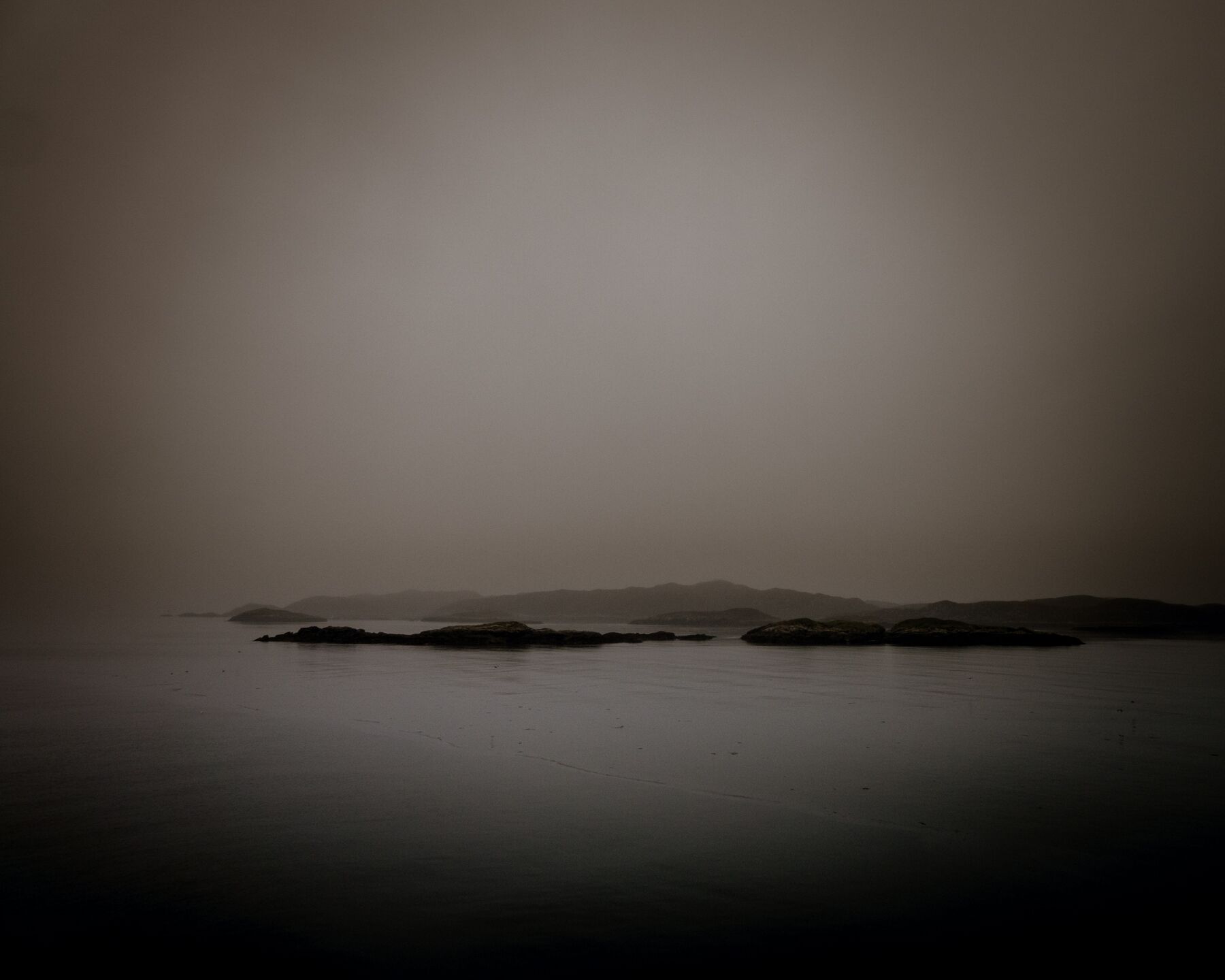
SCALPAY, OUTER HEBRIDES
__
CROWN SHYNESS
Lisa Fleck Dondiego
Forming cracks
and blue rivers in the sky,
the uppermost branches
of tree canopies don’t touch,
but talk to one another,
not stealing light, so each may thrive.
You can find your way through them
after dark if you look up,
follow the space between treetops.
Last year, my neighbor’s sugar maple
had to be cut down. You still
could see the ghost
of its silhouette
against the Shumard oak’s branches,
just as I now see yours
against my own canopy.
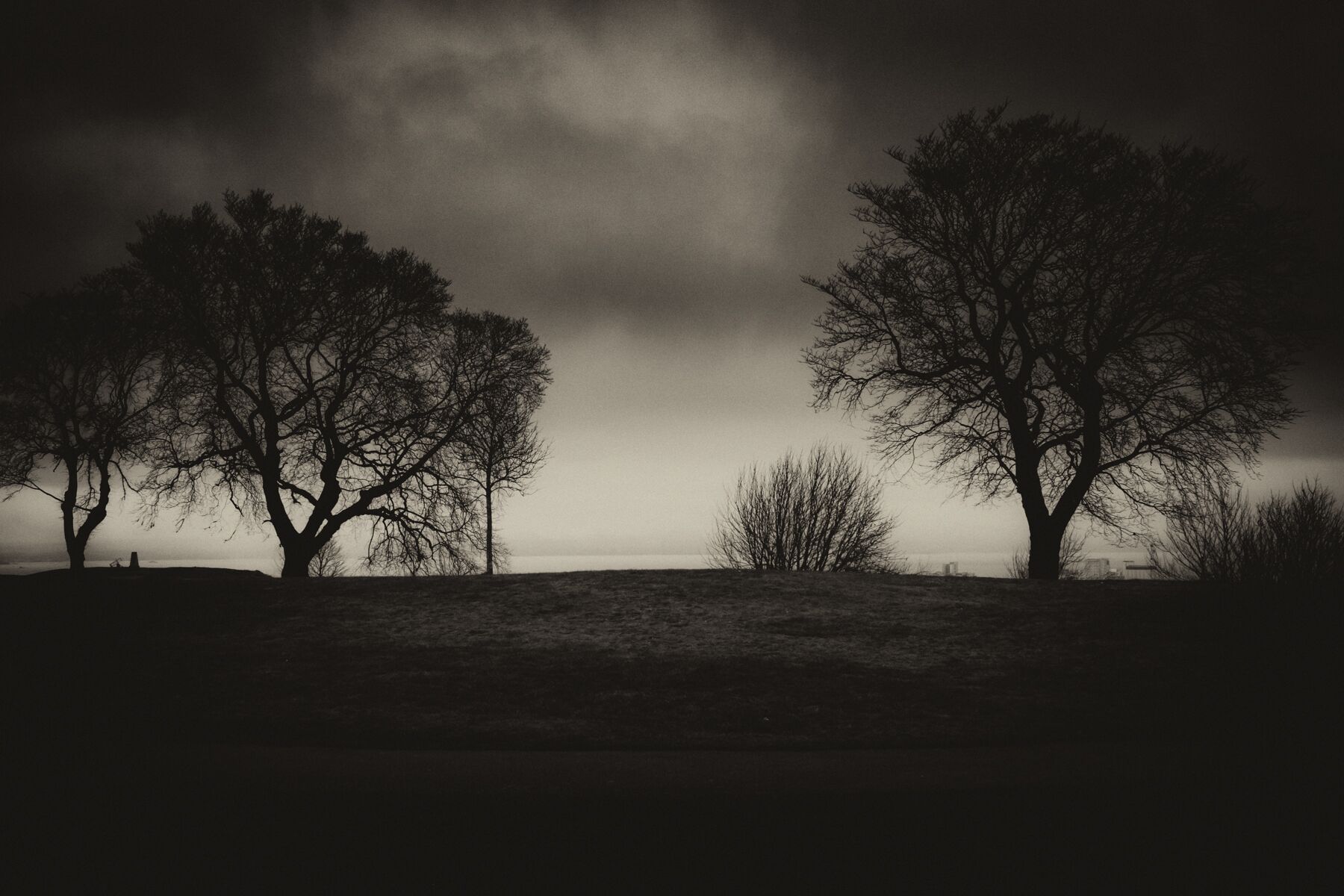
CALTON HILL, EDINBURGH
AFTER
Lisa Fleck Dondiego
I took to visiting the stream
by our road on my walks, would stop
by the bridge, go down the hill
to sit on a boulder by its banks,
stare at the endless play of water.
The rocks jutting out rerouted its flow,
churned its shallows to foam
that floated downstream. In time
I began to select stones, throw
them in idly, note their stillness
while the current rushed over them.
I’d lost track of how many when a last
drab stone appeared in my hand.
I considered its refusal
to bend like wind or water,
then threw it in to join the others.
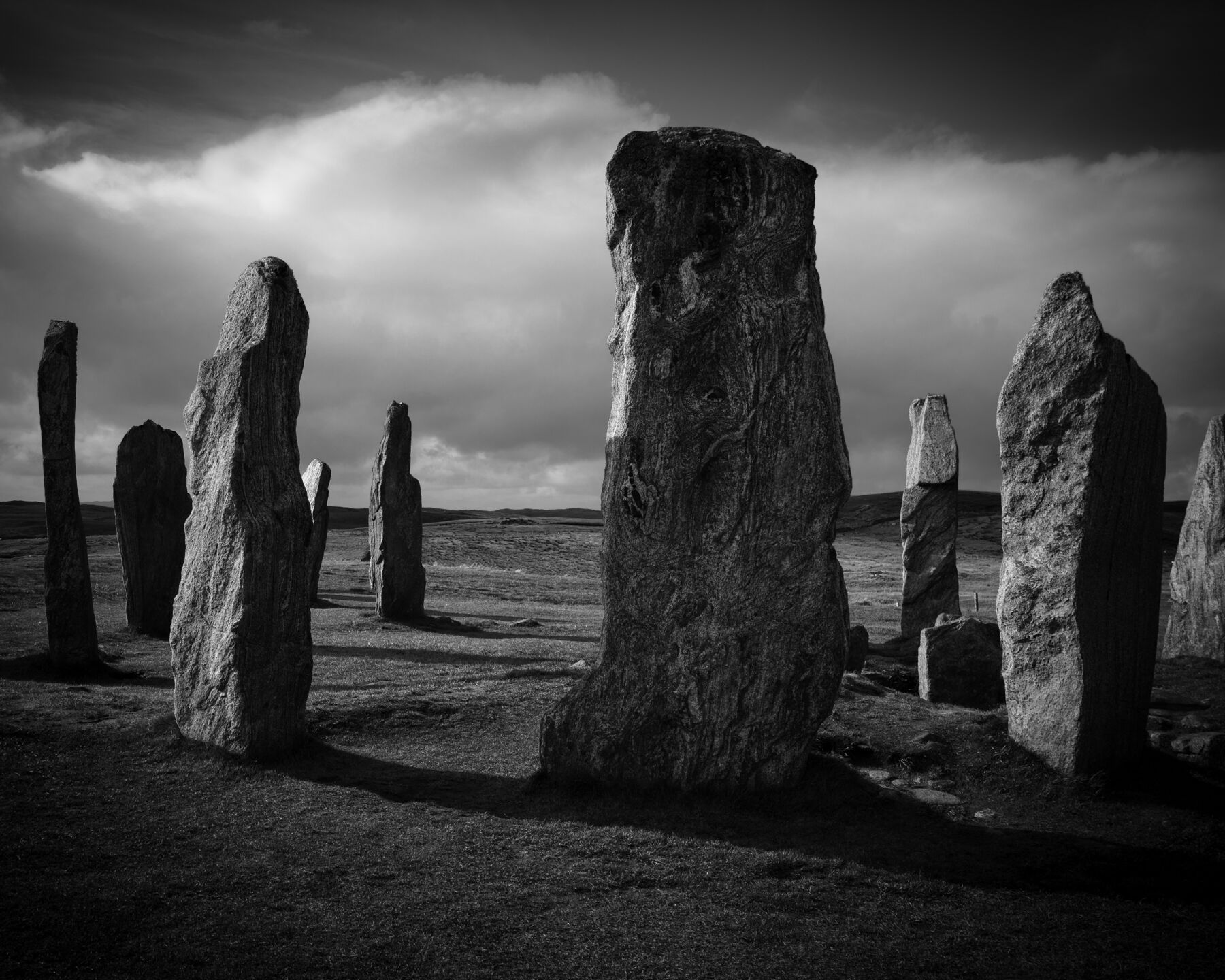
CALLANISH STONES, ISLE OF HARRIS, OUTER HEBRIDES
__
APPROACHING EIGHTY/THE DISTRACTION
Alicia Ostriker
A wide screen a wild scream, a rosy dream, a white screen
—they have left the theater like a flock of birds—
of which she retains neither images nor words
Or: she is sometimes inattentive
she means to put the forks and knives away
back in the drawer
In her peeling yellow kitchen
which is like a
warm old shawl to her
and begins by walking in exactly the wrong direction
or her arm reaches for the wrong drawer
before she catches it
laughs at herself for being wrong again
—laughter the overcoat of her fear—
caw caw the interior crow
APPROACHING EIGHTY/THEY ARE ALWAYS ASKING
Alicia Ostriker
They are always asking
What it is like
to be so
ancient so superannuated
it means they want to know
my thoughts about death
in some ways my relation
to death is
that of a daughter
to her mother
loving and angry
distant and needy
or that of a woman rejecting
the commands and lies
of patriarchy
while at the same time
embracing some
particular man
or like a hippie beating
her breast still crazy
after all these years
hiking the desert
absurdly stubborn
torch in hand in broad daylight
´
ENDINGS
Wallis Wilde-Menozzi
Waves die all the time. The End is the End, but Endings are waves. Waves die but flow into other waves. In Piazza del Duomo in Parma, Italy, a balmy November night with crisp curls of fog, we stood among young people holding paper fish, because their movement is called “The Sardines.” They represent individuals, small, compacted in groups, schools, communities, tribes: the condition of nearly everyone in the world. The Sardines want peace, to be able to exist alongside other schools of fish, where right and wrong mean not to be swallowed whole, indiscriminately. Please—a bit of space, legality and consideration for each and all.
Many old people squeezed in among the young Sardines. One remembered the heart-break of standing in the very same overflowing square when the last twenty coffins with Italian soldiers from the Russian front came back to the region, well after the Second World War ended. More than one hundred families waited, with hopeful dread that their son would be among them.
The woman standing next to me had waited as a young girl, with her grandmother, holding her hand, twisting her fingers, listening for the name of the son for whom the grandmother wiped her eyes everyday. She did not want pain for others, but she hoped her grandmother’s would end. It did not.
Another remembered, in the same wild years after the war, how Fascists would not go out after dark. Many people knew exactly who they were. The Fascists were that close to dying every time they turned onto a dark road. Saving them was only someone rational tugging at the sleeve of the would-be murderer. Just a spark of craziness and everyone might forget that the war had ended.
The end is the end only in a certain way. Waves that die push into other waves. An astounding number are only whoosh and energy. Some are beautiful, the endings’ light catching beginnings, and the sighs are those of wonder.
?
How long did it take to understand the last ending was a beginning?
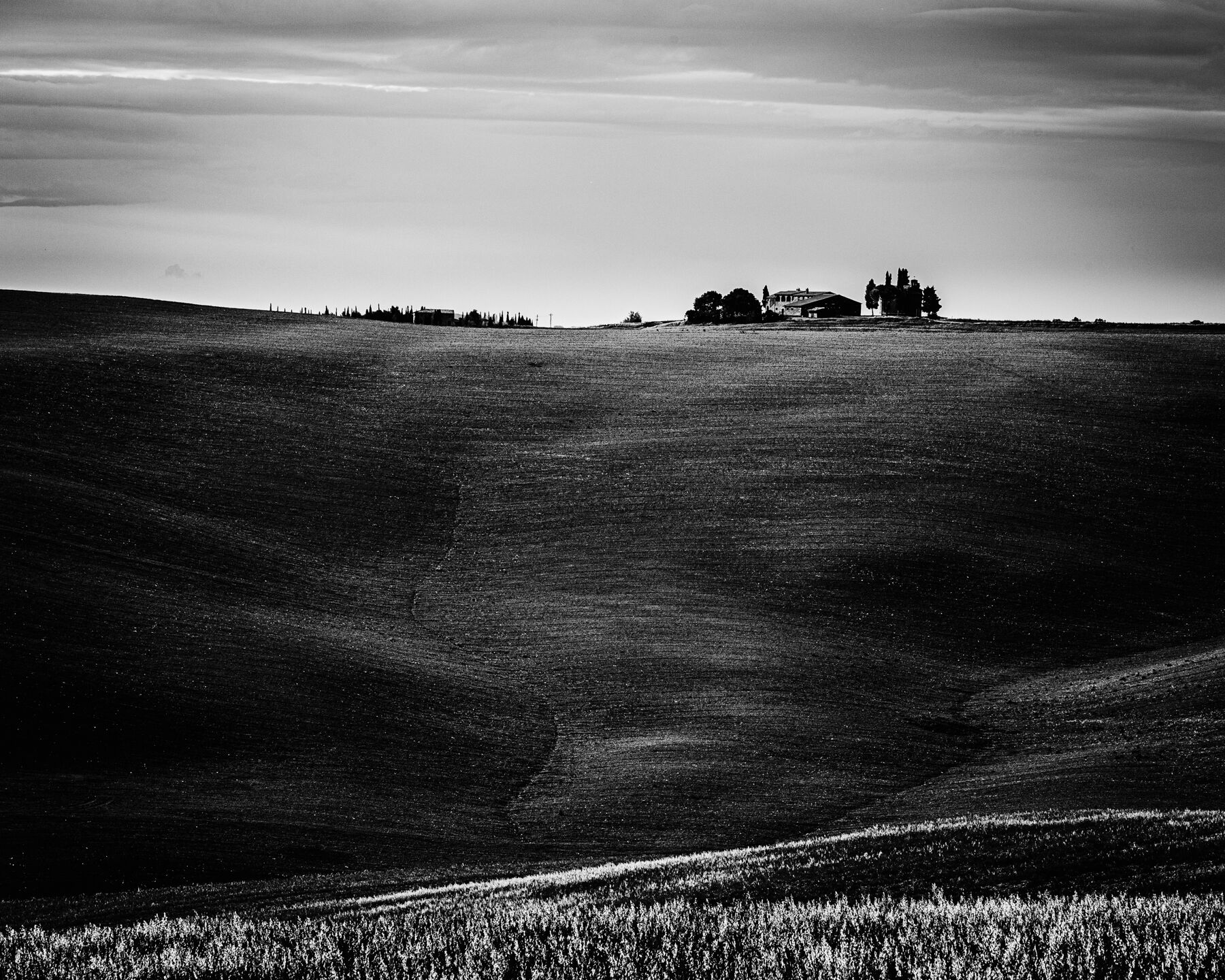
TUSCANY
“Endings” sent to us by former The Sigh Press contributors
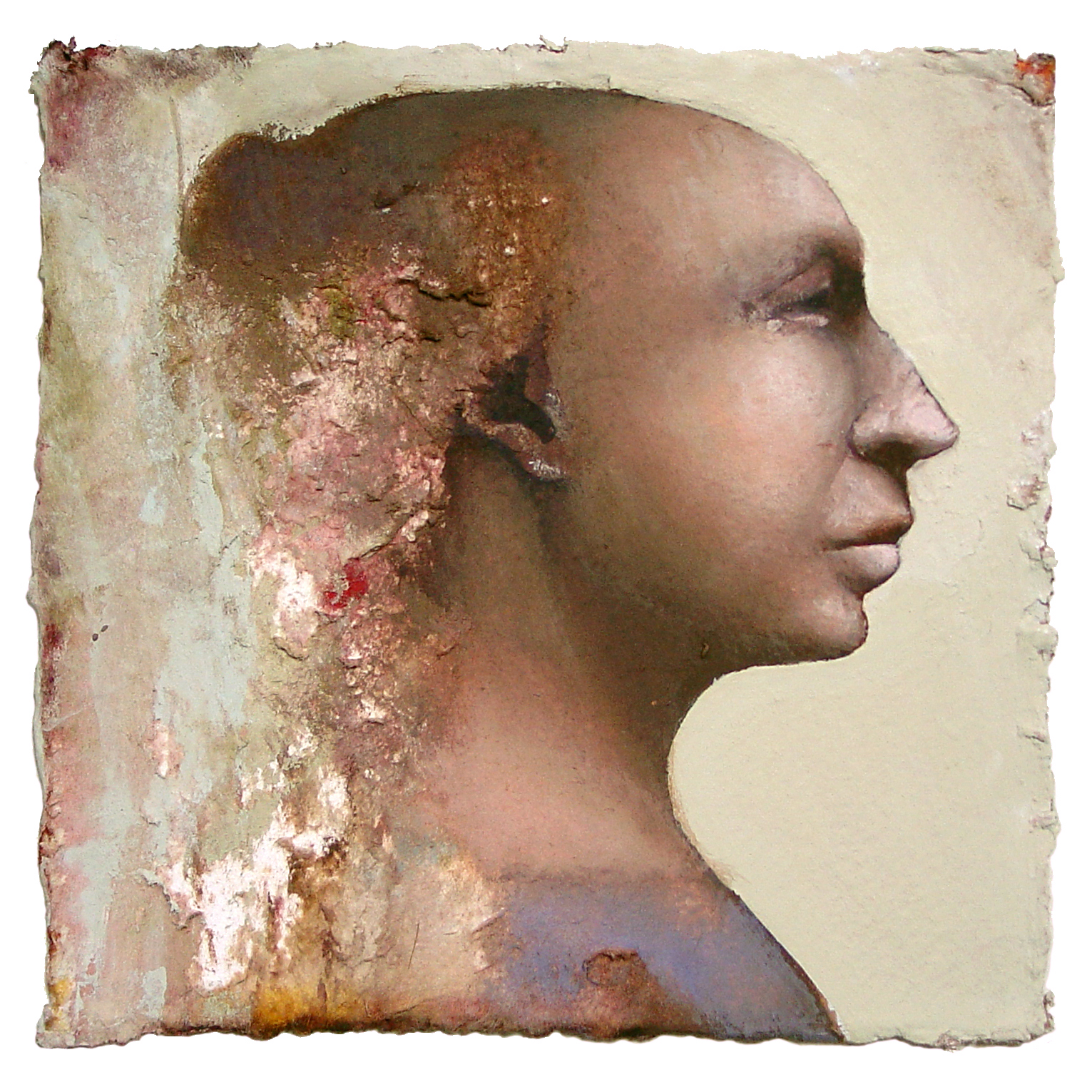
PERSEPHONE
By Janet Gorzegno
Fragment for an Archaeologist
— Richard James Allen
Black snake’s old skin rhythm left on porch eye sockets whole
Diamond glitter prime principle
— Jeffery Beam
Prone to nostalgia, I dread endings. I am perpetually looking back for a last
glimpse, a final wave, and I will always take an “a presto” over a hard
goodbye.
— Jessie Chaffee
Although the cypress may not last long
Its shadow remains in our hearts.
— Charles Halsted
You will probably find there is no finish line
Just a change of gait.
— Kevin Harper
A & B at Étretat
A to B: But I’m getting older!
B to A: So is the hole in the rock.
— Elizabeth Logan Harris
The Sigh Press zips its witty lip?
But *****???
Apostrophe’s Tuscan Accent non è più?
–Dash–of–poetry, Comma’s pauses,,,,,,,
(((((Bracketed away)?
No!!!!!!! We’ll still know where to find them.
A thousand thank-yous, Mundy, Lyall,
all you writers, artists. Let’s just call this an ellipsis…
— Alex Josephy
In life of course most of us are afraid of endings: we like the comfort of the
familiar, and I more I think than most. But in writing, ending a novel is my
favourite part, a moment of pure unadulterated happiness, not because the
ordeal is done but because the ending is the time to make sense of all that
has led up to it, a time to reflect on what one has managed to say and do,
to bring order and harmony.
And then begin again.
— Christobel Kent
receding from me in the twilight
an emaciation of you
a solemnity of you
a sun will show you out
—
this is the terminal
ward
join me
we will drape crepe paper
over the windows
and doors
— Anne Lettick
Now even the diehard guests are getting ready to leave; they are numb with
fatigue and alcohol. Outside the darkness has deepened into blackness and
can no longer be negotiated with. Someone lights a cigarette and murmurs,
“How long till dawn?” Someone else says, “I always feel so sad when parties
end.” Slender blades of light secrete themselves into the room. And it is as
though nature has decided to be merciful.
— Baret Magarian
Twenty in a blue dress at midnight on the Rue des Tournelles and Avenue
Victor Hugo
Gathering your balance from under the pastis to mount your heavy bicycle
and wave, like letting go
— Stephen Morrison
If as many, including my friend J, who quotes Arrighi, have speculated
that 1848 was a dress rehearsal for 1917,
and have asked what 1968 serves as rehearsal for?
The arrival of opening night may be its own beginning.
With Chile, Hong Kong, Lebanon, Puerto Rico, Ecuador, Catalonia,
Colombia, Iraq, with the Indigenous fighters in all corners of the world,
la lotta continuava, continua, e continuerà.
— Andreas Petrossiants
In the end, it was enough,
Enough to have shared.
Happily, they everly
Sigh.
— Paula McGrath
Sweet sorrow Sigh so salient Sigh start sustenance Sigh
Some say Sigh saved sensibilities Sigh So say Igh
— Kevin McFadden
All my endings have been inside-out beginnings and in saying goodbye, I
feel already our next embrace. Until then, I bid you khodahafez (may God
keep you safe).
— Kamin Mohammadi
They said start with a plot: a beginning a middle an end
Time taught me the end ties to the middle,
the beginning to the end, and a life is nothing but a knot
— Jonaki Ray
The book cover slammed shut causing a rush of ink-scented air.
The she elephant knew exactly what to do and inhaled a huge
gasp of ant then expelled with a noisy trumpeting blast.
Pages of the book flew open and detached themselves and
suddenly swirling words and writhing letters floated away into the air, free
to see where and how they reincarnate.
The bright green parrot fluttered down to the unopened bottle of
red wine, turned and gave a very knowing wink.
Thank you.
— JG Sapodilla & JJ Piglet
Though endings sadden the hell out of me, they almost always prove a mere
transition toward something new. Heartfelt applause and thanks to Lyall
and Mundy for all they’ve done. I can’t wait to see the next bright creature
that will surely emerge after a little rest in the chrysalis.
— Jeff Shapiro
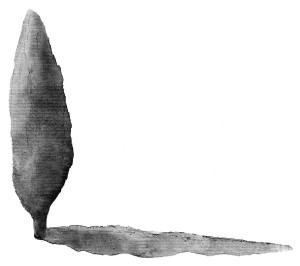
Issue 23 is our last issue. Sigh.
Whole hearted thanks to all our readers.
Visit www.thesighpress.com for details.
© 2019 THE SIGH PRESS
None of the work published by The Sigh Press may be copied
for purposes other than reviews without the author and artist’s written permission.